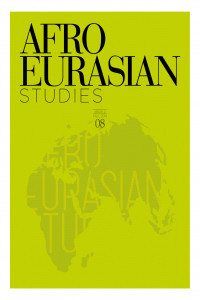Islamic Ethics towards Environmental Protection
Islamic Ethics towards Environmental Protection
___
- Abu-Yusuf, 1985. Kitab al Khirai, Beirut, Darul Kitab.
- Gore, A. 1992. Earth in Balance, Forging a new Common Purpose, London, Earthscan.
- Canan, I., 1995. Environmental Ethics in the light of the Prophet’s Hadits, Istanbul, New Asia Press.
- Cengiz, P., 2012. Katarcamilerindeteolojivaazı, Istanbul, Taraf 7 November 2012.
- Club of Rome, 1992. Limits to Growth, authored by Meadows D H, Randers D I and Behrens W, London Pan Books.
- Cragg, K., 1971. The Event of Koran, London, George Allen Unwin.
- Ferguson, B. and Roach, P., 1993. Christian attitudes to nature and ecological crises, Irish Biblical Studies, Volume 15, pp. 98-114.
- Galbrtaith, J. K., 1974. Economics and Public PurposeLondon, Andrea Deutsch.
- HRH Prince Phillip the Duke of Edinburgh, 1992. The importance of religion for conserva- tion so that God’s creation Might Live, PP. 8-18, Istanbul, Phanar Patriarchate.
- Holy Koran, 1909. Translated from Arabic by J M Rodwell, New York, Dutton.
- Ibni-Mace, 1952. SunennuIbni Mace, Investigated by M FuadBadulbaki, Cario, DarulI- hyaiKutubul Arabia.
- Ibnu’l-Esir, 1970. Usu’l Gabe fi MarifetisSahabe, Cairo, Darul Sabah.
- IzziDien, M., 2000. Environmental Dimensions of Islam, Cambridge, Butterworth.
- Kula, E., 2006. History of Environmental Economic Thought, London, Rutledge.
- Malthus, R. T., 1798. An Essay on the Principle of Population as it Affects the Future Improve- ments of Society, London, Warlock.
- McHarg, I., 1977. “The place of nature in the city of man”, Annals of American Academy of Political Science, Vol. 352, pp. 2-12.
- Mill, J. S., 1848. Principles of Political Economy, New York, Appleton.
- Munavi, S., 1972. Feyzu’l Kadir Sherhu’l Camiu’s Saghir, Beirut, Darul Marife.
- Phanar Patriarchate, 1992. So that God’s Creation Can Live, Istanbul, Phanar Patriarchate.
- Resources for Freedom, 1952. Printed by the US Material Commission, Washington.
- Ricardo, D., 1817. Principles of Political Economy and Taxation, London, Pelican Books.
- Ruthven, M., 1991. Islam in the World, London, Penguin.
- Stahl, R., 1993. “Educating for change in the attitudes towards nature and environment among oriental Jews in Israel”, Environment and Behaviour, Vol. 25, pp. 3-21.
- Thomas, K., 1984. Man and the Natural World; Changing Attitudes in England 1500-1800, London, Penguin.
- Tuan, Y. F., 1968. “Discrepancies between environmental attitude and behaviour; exam- ples from Europe and China”, Canadian Geographer, Vol. 12, pp.176-91.
- White, L., 1967. “Historic roots of our ecological crises”, Science, Vol. 155, pp. 1203-07.
- ISSN: 2147-110X
- Yayın Aralığı: Yıllık
- Başlangıç: 2012
- Yayıncı: Musiad (Independent Industrialists and Businessmen's Association)
The Evolution of Exchange Rate Pass-Through in Turkey: Does Inflation Targeting Matter?
Dincer DEDEOGLUA, Huseyin KAYAB
A Time Series Analysis of the Determinants of Private Savings in Turkey
Understanding French Foreign and Security Policy towards Africa: Pragmatism or Altruism
Long-term marketing effectiveness in Turkey: Does it differ from that in the US and Western Europe?
Koen PAUWELS, Ela ARİ, Yusuf OC
